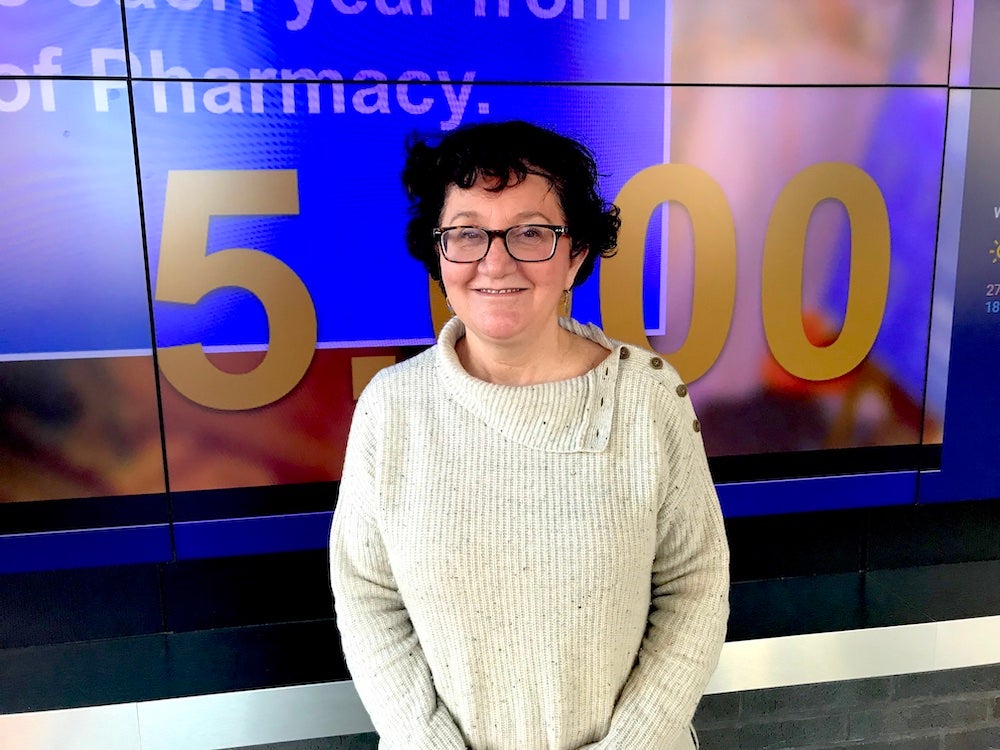Maggie Charpentier will lead local chapter’s advocacy for pharmacists, patient care, public health
University of Rhode Island College of Pharmacy Clinical Professor Maggie Charpentier has been appointed President of the Rhode Island Society of Health-System Pharmacists (RISHP), putting her in position to expand advocacy for pharmacists in the state with the ultimate goal of further improving patient care.
ASHP is a non-profit, professional association established to advance public health by promoting the professional interests of pharmacists practicing in hospitals and other organized health care settings. ASHP representatives inform and advise local and federal legislatures on important pharmacy-related issues, and local chapters vote on the national society’s initiatives, such as pharmacist board certification, compounding, reimbursement, expanding pharmacist practice licenses and more. The ultimate goals of ASHP are to further involve pharmacists in ensuring improved patient care.
“One role of the board to help us transition out of COVID into a more vibrant, interactive, involved pharmacy throughout the health care system… accepted, respected and more widely available,” Charpentier said. “We’re advocating to expand the involvement of pharmacists at all health care levels, both locally and nationally.”
Having pharmacists involved in patient care from the beginning — from the time patients enter the hospital through the emergency department, for example — is vital to care, Charpentier said. A pharmacist is needed to interview patients about their full medication history, not just that which appears on their medical chart. Perhaps a patient recently started taking a medicine at home, or received an injection in a physician’s office that’s not listed in the electronic profile.
“We find out much more thoroughly what medications they’re actually taking, not just what’s listed,” Charpentier said. “It is vital to know that. There could be an adverse reaction or some other issue that could be easily overlooked without a thorough medication history. Without that vital information, it can contribute to new admissions, increased morbidity of the patients and lack of adherence. We certainly advocate to put pharmacists in position to help.”
Charpentier takes the helm of the local chapter at a time when ASHP is laying out its initiatives for pharmacists nationally through the next decade. The organization’s Practice Advancement Initiative aims to:
- Optimize care via pharmacist‑provided comprehensive medication management.
- Advance pharmacy technician roles.
- Harness data to improve patient health.
- Integrate pharmacy enterprise for convenient and cost‑effective care.
- Adopt personalized, targeted therapies.
- Expand public health opportunities in social determinants, chronic illness and addiction.
Charpentier plans to work with MJ Kanaczet, director of the URI Office of Continuing Professional Development, to increase the pharmacy technician workforce, which she identifies as one of the profession’s most immediate needs. She also plans to partner more closely with the Rhode Island Pharmacists Association, currently headed by URI alum Chris Federico, to combine and advance each other’s initiatives; recruit younger pharmacists to serve an advocacy role for the profession; promote and expand pharmacists’ volunteer efforts; and help lead the transition out of the COVID-19 pandemic, which has been difficult on pharmacists and all health care workers.
“The pressures on pharmacists during COVID have led to so much burnout and less job satisfaction. I see the stress and the concerns of the younger pharmacists and I want to ensure that they expand their role and have the same satisfaction I’ve had in my career,” Charpentier said. “If I can assist in transitioning through this, engaging young people and expanding their roles, and ensuring that we have good techs to help us in that role, then our profession will be better for it.”

